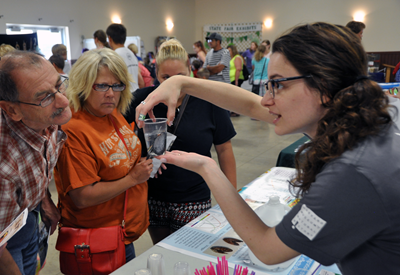For the last 18 months, the National Center for Science Education has been conducting an experiment in Iowa City. Our question: Can a grassroots community effort improve understanding and acceptance of topics such as climate change and evolution that are societally, but not scientifically, controversial? We’ve been writing about the results on the NCSE blog, but if you missed them, here are a few recent highlights.
“you can’t do evolution outreach here”
One of the reasons that many classroom teachers avoid or downplay teaching evolution and climate change is fear of controversy. Just one angry parent can have a stultifying and, often, lingering effect. So when we started talking about organizing Science Booster Clubs to bring hands-on evolution and climate change activities to community events in Iowa City, many people in  local education circles were skeptical. A little more than a year later, after dozens of successful and popular events, the Iowa City Science Booster Club was asked to develop a science outreach booth focused on evolution at the Iowa State Fair. We estimate that some 10,000 people came by the booth in just one day. How did we get from “no way” to “more, please!” so quickly? Emily Schoerning, the National Center for Science Education’s Director of Research and Community Organizing, tells the story here.
local education circles were skeptical. A little more than a year later, after dozens of successful and popular events, the Iowa City Science Booster Club was asked to develop a science outreach booth focused on evolution at the Iowa State Fair. We estimate that some 10,000 people came by the booth in just one day. How did we get from “no way” to “more, please!” so quickly? Emily Schoerning, the National Center for Science Education’s Director of Research and Community Organizing, tells the story here.
the secret to improving adult science literacy: it’s not what you expect
Sure, it’s fun to do science activities at community events, but does it have any lasting impact? Preliminary results from our new Science Booster Club program in Iowa suggest that it does: scores on a stripped-down test of science literacy improved significantly in a community that held six events in the last year. Was it the brilliance of the programming? The skill of the presenters? No doubt that helped. But we think the answer may be simpler and more universal. Emily explains in her recent post: "Outreach With Impact".
can graduate students change the world? why, yes. Yes, they can.
What happens when you let a molecular biology graduate student out of the lab and put her to work facilitating fun science activities at a farmer’s market? Changed lives, that’s all. In “Nice to Meet You,” NCSE’s newest staff member, Claire Adrian-Tucci, describes how she was bitten by the science outreach bug, and how she felt when she saw “the light bulb come on above people’s heads” after she handed them a thermometer and packed them into a small plastic greenhouse.
NCSE Booster Clubs are scaling up
NCSE members and supporters are starting clubs in Tennessee, Virginia, and DC. We want to help you learn how to energize your community around science. If you are interested in starting a booster club in your community, email us at info@ncse.com!

